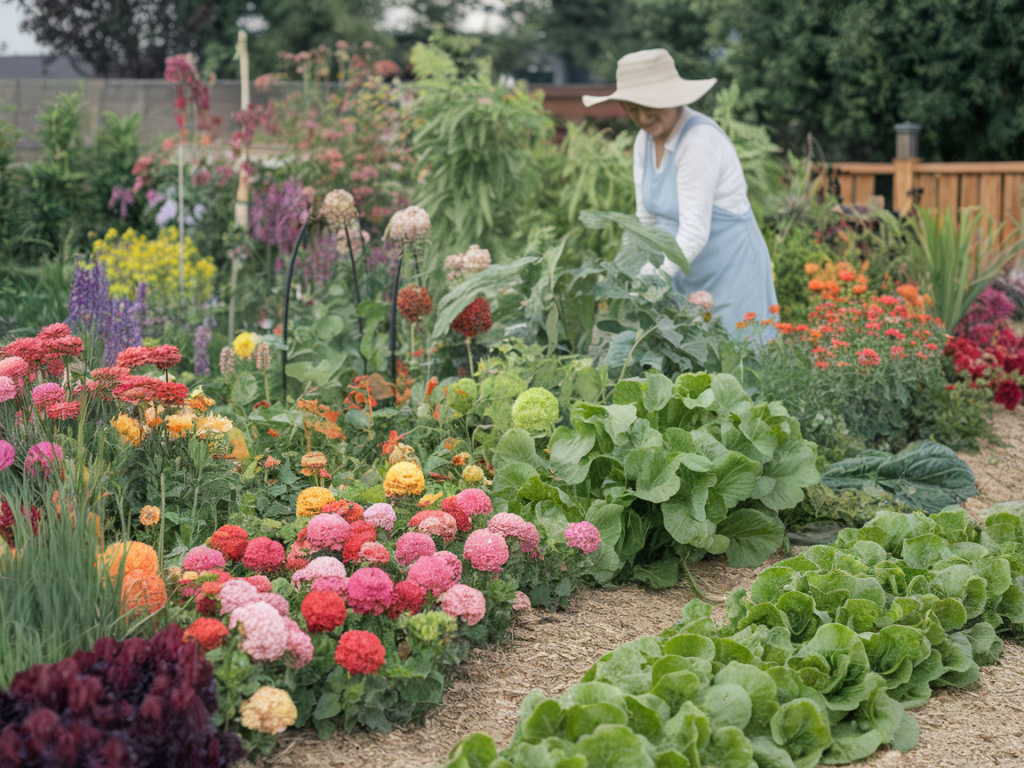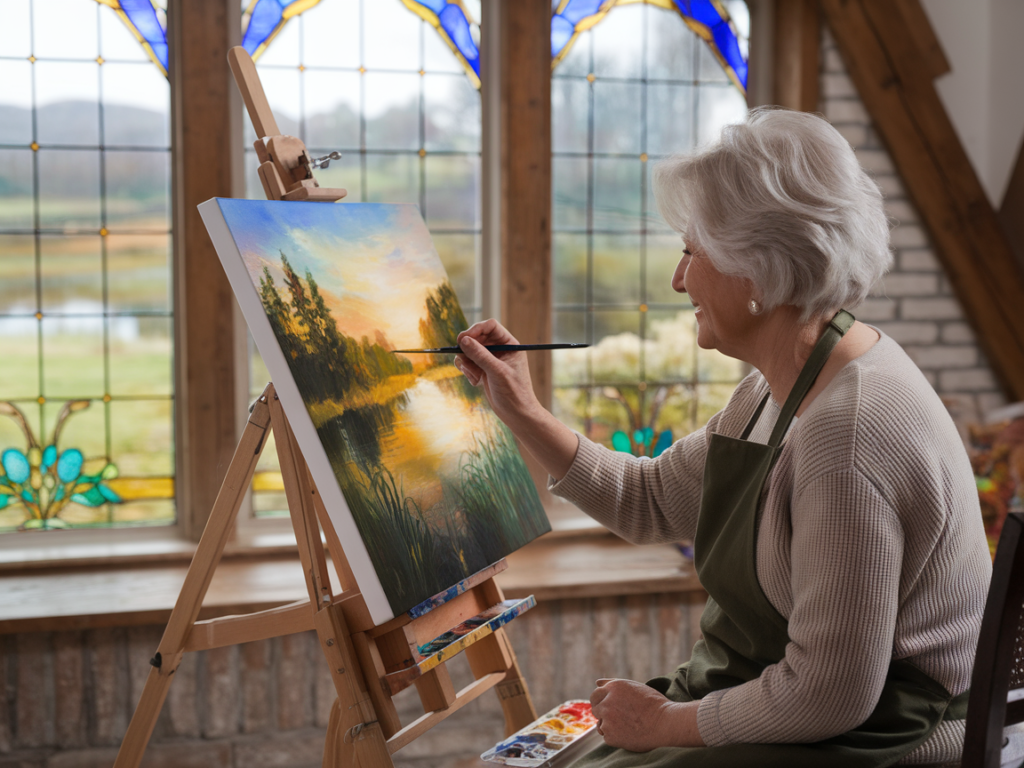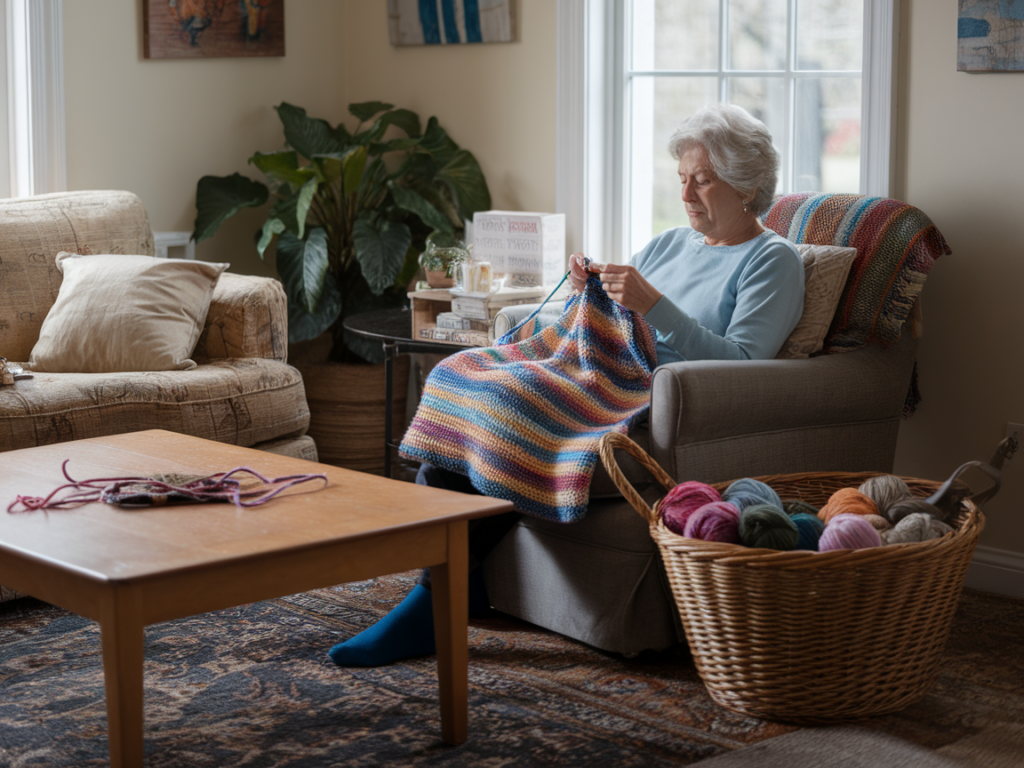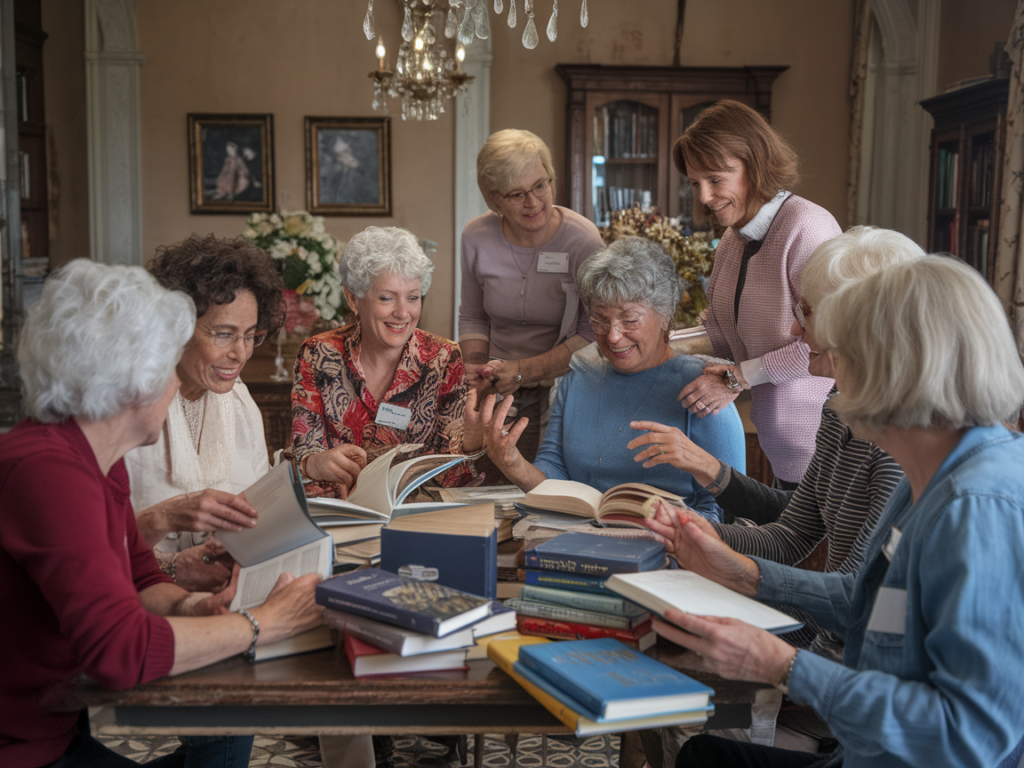
Exploring 15 Fun Hobbies for Retired Women to Try Today
Retirement offers a wonderful opportunity for women to explore new interests and rediscover old passions. If you’re looking for something fun to do, here are fifteen engaging hobbies that you might try today.
1. Gardening

Creating a garden can be both relaxing and rewarding. You can grow flowers, vegetables, or even herbs. Whether you have a big yard or just a small balcony, gardening connects you with nature and beautifies your space.
2. Painting or Drawing

Art is a wonderful way to express yourself. You don’t need to have extensive training to enjoy painting or drawing. Grab some supplies and let your imagination flow. There are numerous online tutorials available to help you get started.
3. Cooking and Baking

Experimenting in the kitchen can be a delightful hobby. Try new recipes, enhance your cooking skills, or take a baking class. Cooking provides an excellent opportunity to share meals with family and friends, creating lasting memories.
4. Photography

Capture the beauty around you by taking up photography. Whether you use a smartphone or a professional camera, photography allows you to express your unique perspective. Join local photography groups to get inspired and improve your skills.
5. Knitting or Crocheting

Knitting and crocheting can be incredibly soothing. You can create beautiful scarves, blankets, or even toys. These crafts promote mindfulness as you focus on your patterns and stitches.
6. Volunteering

Giving back to the community can be fulfilling and impactful. Consider volunteering at local shelters, schools, or hospitals. Your experience and skills can greatly benefit those around you while also helping you connect with new people.
7. Joining a Book Club

If you love reading, why not join a book club? This hobby not only enhances your reading experience but also allows you to engage in discussions with fellow book lovers. It’s a lovely way to make friends and share opinions.
8. Learning a Musical Instrument

Have you always wanted to play an instrument? It’s never too late to start! Whether it’s a piano, guitar, or flute, learning music can be incredibly rewarding. Many community centers offer classes for beginners.
9. Hiking
Exploring nature through hiking is a fantastic way to stay active. Find local trails and enjoy the beauty around you. Hiking allows for peaceful moments of reflection while benefiting your physical health.
10. Writing

Writing can be a therapeutic hobby. You might try journaling, writing poetry, or even starting a blog. Sharing your thoughts, experiences, and stories can offer a sense of accomplishment and connection with others.
11. Dancing
Get moving by taking dance lessons. Styles range from ballroom to salsa, so you can choose what intrigues you most. Dancing is a fun way to socialize and stay active while enjoying rhythm and expression.
12. Crafting

Engaging in crafts such as scrapbooking, card making, or DIY home decor allows you to unleash your creativity. You can personalize gifts for loved ones or create art for your home.
13. Bird Watching

This calm and meditative hobby allows you to connect with nature. All you need is a pair of binoculars and a field guide. Bird watching can introduce you to new parks and outdoor spaces you might not have explored before.
14. Learning a New Language

Challenge yourself by learning a new language. With many apps available, you can practice whenever you have a moment. Plus, it’s an excellent way to mentally stimulate your mind and prepare for potential travels.
15. Sewing or Quilting
Try your hand at sewing or quilting. This hands-on hobby not only allows you to create beautiful items for yourself or as gifts, but it also gives you a sense of pride in your creations. Join a local sewing circle to meet fellow enthusiasts!
No matter what hobby captures your interest, diving into something new can energize your retirement years. Embrace the change and enjoy every moment of your newfound adventures!
Benefits of Engaging in Hobbies After Retirement
Retirement is a new chapter filled with opportunities to explore new interests and passions. Engaging in hobbies during this time can markedly enhance your quality of life. Embracing activities you love not only helps fill your days but also brings numerous benefits that can positively impact your mental, emotional, and physical well-being.
One of the most significant benefits of making hobbies a part of your retirement is the improvement in mental health. Activities such as painting, gardening, or writing can stimulate your creativity and keep your mind engaged. Research shows that staying mentally active can reduce the risk of cognitive decline, helping you maintain sharp thinking skills as you age. Whether you choose to learn a new instrument or dive into puzzles, the mental workout provided by these hobbies is invaluable.
Social interaction is another crucial benefit. Many hobbies encourage social gatherings, which can help you build and maintain relationships. Joining clubs, classes, or community groups based on your interests allows you to meet people who share similar passions. From book clubs to crafting circles, these social outlets can combat feelings of loneliness and foster a sense of belonging in your community.

Engaging in hobbies also promotes physical health. Many activities, such as hiking, dancing, or yoga, can improve your physical fitness. Regular physical activity enhances your overall well-being, helps maintain a healthy weight, and reduces the risk of chronic diseases. Even gentler pursuits like walking or gardening can provide sufficient activity levels to keep you energized.
Additionally, hobbies can provide a sense of purpose and achievement. After years of professional responsibilities, transitioning into retirement can feel disorienting. Finding a new passion can recharge your sense of purpose. Whether it’s through volunteering, learning to cook, or taking up photography, achieving personal goals in your hobbies offers satisfaction and a renewed outlook on life.
Furthermore, engaging in hobbies can reduce stress. When you immerse yourself in an activity you love, it allows you to escape from daily stressors and anxieties. Activities such as knitting, painting, or playing games can be very therapeutic. The calming effect of these hobbies can lead to a healthier and happier mindset, helping balance emotional ups and downs.
Some hobbies that are particularly popular among retired women include:
- Gardening: Cultivating plants not only beautifies your home but also provides a great sense of accomplishment.
- Crafting: From knitting to scrapbooking, creating something by hand stimulates creativity and serves as a wonderful outlet.
- Learning a musical instrument: It’s never too late to take up music. Playing an instrument can be extremely rewarding and beneficial for brain health.
- Cooking or baking: Experimenting in the kitchen can be a delicious way to unwind and share joy with family and friends.
- Volunteering: Giving back to your community can create meaningful connections and a profound sense of fulfillment.
In addition, maintaining a rich variety of hobbies can prevent monotony. With an array of interests, you can explore something new every day. This not only keeps you engaged but also continually challenges you. Trying out different hobbies can lead to discovering hidden talents and passions that you may not have recognized before.
It’s crucial to remember that the journey into retirement is a unique path for everyone. Embracing the freedom to choose your hobbies can be an exciting adventure. The key is to select activities that genuinely interest you, providing joy, fulfillment, and a sense of belonging. So, whether you decide to take up painting, writing, or even birdwatching, enjoy the freedom to explore and express yourself in ways that invigorate your spirit.
Engaging in hobbies post-retirement comes with a treasure trove of benefits. Whether it’s improving mental health, fostering social connections, or boosting physical fitness, these activities can elevate your retirement experience immensely. So, dive into your passions today and unlock the remarkable advantages waiting for you in your new stage of life.
How to Choose the Right Hobby for Your Interests
Finding a hobby that matches your interests can be a rewarding journey. Whether you are exploring new passions or reigniting old ones, selecting the right hobby helps you remain engaged and happy. Here’s a guide to assist you in choosing a hobby that will add joy to your life.
Identify Your Interests
Start by reflecting on what you truly enjoy. Consider the activities that make you feel most alive. Do you love working with your hands, or do you prefer activities that spark your creativity? Making a list can be a helpful first step. Write down anything that comes to mind, including:
- Artistic activities (painting, drawing, crafting)
- Physical activities (yoga, hiking, dancing)
- Mental activities (reading, puzzles, writing)
- Social activities (volunteering, group sports, book clubs)
Assess Your Lifestyle
Another important factor in choosing a hobby is your lifestyle. It’s crucial to align your new interest with how you want to spend your time. Ask yourself:
- How much time can you realistically dedicate to a hobby each week?
- Do you prefer activities you can do alone or with others?
- Are you looking for something low-cost, or do you have a budget to spend on materials and classes?
Understanding your current lifestyle can help narrow down your options significantly.
Consider Your Physical Abilities
Your physical abilities play a significant role in selecting a hobby. If you want something that keeps you active, consider hobbies that match your level of fitness. On the other hand, if mobility is a concern, think about more stationary activities. Here are some ideas based on ability:
- For active fun: swimming, cycling, gardening
- For moderate action: walking groups, stretching classes, tai chi
- For seated activities: knitting, painting, writing
Explore New Skills
Don’t hesitate to venture outside your comfort zone. Trying something you’ve never done before can be exciting and rewarding. Look for local classes or workshops that can help you learn new skills. Here are some considerations:
- Cooking or baking classes
- Photography or digital media courses
- Language learning meetups
These experiences can lead to discovering passions you never knew you had!
Connect with Community
A hobby can also be a great way to meet people. Joining groups or clubs can enhance your experience, adding social connections to your life. Look for local or online communities around your interests. Think about:
- Joining a book club for literature lovers
- Participating in local art classes to meet fellow artists
- Engaging in community sports leagues for some friendly competition
Make It Sustainable
Your chosen hobby should be something that you can maintain over time. Consider its sustainability to ensure lasting enjoyment. Ask yourself:
- Can I easily access the materials or space needed for this hobby?
- Will I be able to continue this hobby, even if my schedule changes?
Finding a hobby that fits seamlessly into your daily life will greatly increase your satisfaction and commitment.
Pick a Few to Try
Don’t feel pressured to choose just one hobby. Pick two or three interests that excite you, and give them a try. This way, you can explore and determine what you truly enjoy. Don’t forget: it’s okay to change your mind and switch to another hobby if one doesn’t resonate with you.
Choosing the right hobby for you is a personal journey that should enhance your life’s joy and fulfillment. By reflecting on your interests, assessing your lifestyle, and exploring new opportunities, you can find activities that bring excitement and happiness into your life.
Social Connections Through Hobbies: Building Friendships
Finding social connections can be a rewarding part of life, especially as we navigate through various stages. Engaging in hobbies is a fantastic way to build friendships and create a sense of belonging. When you pursue an interest you love, you often find others who share that passion. Here are some wonderful hobbies that can help foster friendships and social connections.
Participate in Group Activities
Joining a group based around a hobby can open doors to new friendships. Whether it’s a book club, knitting circle, or gardening group, being part of a community helps you meet new people. These activities provide a relaxed atmosphere where you can share your thoughts and experiences. Here are some popular group hobbies:
- Book clubs
- Fitness classes (yoga, dance, etc.)
- Cooking workshops
- Art classes (painting, pottery, etc.)
- Walking or running groups
Taking Classes for New Skills
Learning something new not only enriches your mind but also allows you to meet fellow learners. Consider enrolling in classes offered by local community centers, colleges, or online platforms. Whether you choose painting, photography, or coding, shared learning opportunities encourage connections. Often, these classes have a social element where students can share experiences and insights, building camaraderie.
Volunteering as a Hobby
Volunteering your time for a cause you care about can introduce you to like-minded individuals. You connect over shared goals and values, which can lead to deep and meaningful friendships. Options for volunteering are vast, including:
- Animal shelters
- Food banks
- Community gardens
- Hospital or hospice care
- Schools or mentorship programs
Organizing Events
Consider hosting events based around your interests, inviting friends and neighbors to join in. Whether it’s a weekly game night, a monthly potluck, or even a crafting session, creating a routine can foster connections. People appreciate effort, and your initiative can make others feel welcomed and valued.
Exploring Sports and Outdoor Activities
Participating in sports or outdoor adventures is a dynamic way to meet new friends. Activities like hiking, cycling, or joining a local sports league can provide fun and excitement. Engaging in physical activity together naturally builds camaraderie. You might consider:
- Joining a walking or hiking club
- Participating in community sports
- Finding local biking groups
- Taking up birdwatching
- Gardening in a community plot
Crafting and DIY Projects
Crafting is not only a great way to express your creativity but also a superb platform for making connections. Attend workshops at local craft stores or community centers where you can meet fellow crafters. Sharing ideas, techniques, and projects can lead to valuable friendships. Activities like scrapbook making, sewing groups, or DIY home decor projects can form incredible bonds.
Online Communities
The internet is filled with opportunities to connect over shared interests, allowing you to communicate with others from the comfort of your home. Forums and social media groups are excellent places to discuss everything from hobbies to life experiences. Whether it’s joining a photography group on Facebook or participating in an online cooking class, these virtual connections can often translate into real friendships.
Finding Joy in Shared Interests
Ultimately, hobbies provide an amazing outlet for social interactions that can enhance your life. Engaging in shared activities is more than just spending time; it’s about creating an environment where friendships can blossom. As you explore various hobbies, remain open to new experiences and the possibilities they bring. You’ll discover that with each new connection, you enrich your life further.
Embrace your hobbies as stepping stones to friendship. With each skill you learn, every event you attend, and each new friend you make, you’ll find joy in the wonderful journey of connection.
Low-Cost Hobbies for Retired Women on a Budget
Retirement can be a wonderful time to explore new hobbies, especially when you’re on a budget. Finding activities that are low-cost yet fulfilling can enrich your life and help you meet new friends. Here are some engaging hobbies that you can start without breaking the bank.
Gardening
Gardening is a soothing hobby that connects you with nature. Whether you have a big backyard or a small balcony, you can start growing flowers, herbs, or even vegetables. All you need are some seeds and soil, which can be inexpensive. Many local communities offer free classes to help beginners learn the ropes. Enjoy the fruits (or flowers) of your labor!
Reading
Reading transports you to different worlds and can be a great companion during quiet times. Libraries offer a plethora of books for free, so you can explore genres you’ve never tried before. Consider joining a book club to add a social element to this tranquil hobby.
Walking
Walking is an excellent way to stay active without any costs involved. You can explore your neighborhood, parks, or nature trails. It’s a fantastic way to clear your mind and enjoy the scenery. You can even invite friends to join you for a couple of laps around the park, turning exercise into a social outing.
Arts and Crafts
Unleash your creativity with arts and crafts! There are countless projects to choose from such as knitting, sewing, or painting. You can often find materials around your home or purchase them at thrift stores. YouTube is filled with tutorials that can guide you through your new projects.
Photography
With just a smartphone, you can dive into the world of photography. Capture moments in your day-to-day life or explore your surroundings. Local parks and scenic routes provide excellent opportunities for budding photographers. You can also find free online courses to improve your skills.
Writing
Writing can be a therapeutic outlet and a way to express yourself. Start a personal blog, journal, or even write poetry. You don’t need any fancy equipment—just a pen and paper or your computer will do! Share your stories online or participate in local writing groups.
Volunteering
Giving back to your community can be one of the most rewarding hobbies. Many organizations seek volunteers, whether it’s at a food bank, animal shelter, or local school. Offering your time can also help you meet like-minded individuals and create lasting friendships.
Cooking and Baking
Try your hand at cooking new recipes or baking treats. Use what you already have in your pantry or utilize local discount grocery stores for budget-friendly ingredients. Cooking can be a fun challenge, and you can even host “potluck” dinners to share your creations with family and friends.
- Explore free community classes for skill-building.
- Join local groups related to your hobbies for added support.
- Consider engaging in hobbies that can also generate a little side income.
Board Games and Puzzles
Reconnect with friends and family through board games or puzzles. You can often find games at thrift stores or borrow from friends. Set aside time for regular game nights to share laughter and build memories.
Birdwatching
This peaceful hobby requires little more than a pair of binoculars and a field guide. You can find birds in your backyard or by visiting local parks. Birdwatching can foster a sense of connection with the environment and provide an exciting challenge.
Online Learning
The internet is full of free resources and classes on virtually any subject. Websites like Coursera and Khan Academy offer a variety of courses that can teach you everything from philosophy to digital marketing. Pick topics that interest you and expand your knowledge without the hefty price tag.
Music Appreciation
Whether it’s picking up an instrument or simply enjoying different genres, music can be a delightful and low-cost hobby. You can learn to play simple tunes on a ukulele or piano using free online resources. Additionally, spend time discovering new artists and expanding your music library through apps that offer free trials.
Diving into new hobbies can bring joy and fulfillment during retirement. With so many low-cost options available, you have the freedom to explore your interests without financial stress. Whether you prefer solitary pursuits or social activities, there’s something here for everyone to enjoy!
Conclusion
As you delve into the world of hobbies, remember that retirement offers a wonderful opportunity to embrace new passions and interests. The 15 fun hobbies highlighted throughout this article can provide you with joy, purpose, and a fulfilling way to spend your time. Engaging in hobbies not only enriches your daily life but also promotes mental and physical well-being.
Choosing the right hobby can feel overwhelming, but it’s important to listen to your interests and preferences. Whether you lean towards gardening, crafting, or volunteering, find what resonates with you. This journey into hobbies can help you discover new skills and interests you never knew you had.
Moreover, hobbies are a fantastic way to foster social connections. Meeting new people who share your interests can lead to meaningful friendships. Joining local groups or classes can also help you stay active and engaged in your community, making your retirement years vibrant and full of life.
For those on a budget, many of the hobbies discussed are low-cost, ensuring that you can explore your interests without financial stress. From book clubs to hiking groups, you can participate in enriching experiences that are kind to your wallet.
Embrace this exciting phase of life by trying out these hobbies. Dive in, explore your passions, and watch how new activities can transform your routine into a colorful tapestry of experiences. The essence of retirement lies in creating memories and finding joy, so don’t hesitate to take the plunge into one or more of these fulfilling pursuits. Your next favorite hobby awaits!